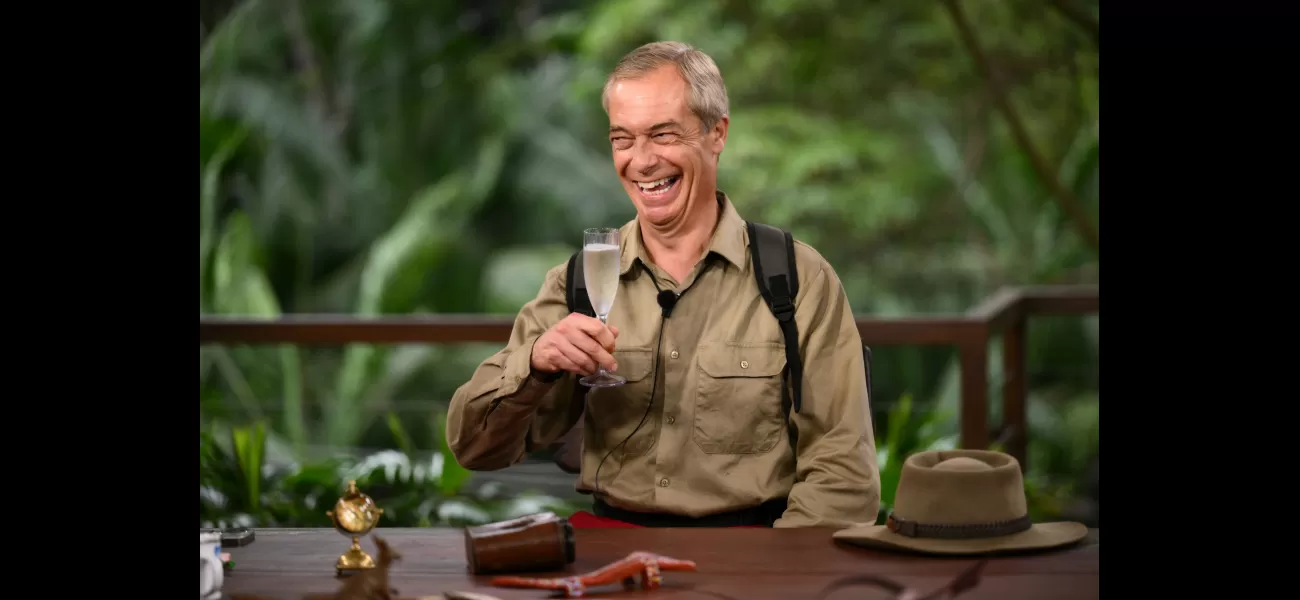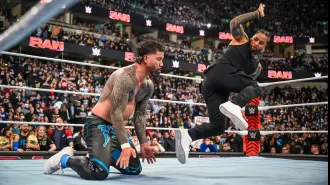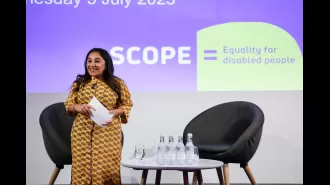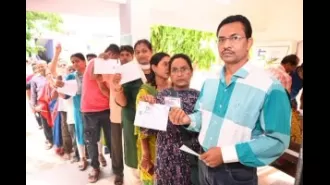TV must own up to role in UK riots
TV can promote a fair and knowledgeable community.
August 8th 2024.

Nigel Farage, a prominent political figure, has recently appeared on the popular TV show "I'm a Celebrity... Get Me Out of Here!" and finished third in the competition. However, while Farage may be making headlines for his reality TV stint, there are far more concerning issues taking place in the UK.
Far-right extremists have been committing violent acts, such as stopping cars to racially profile individuals and setting fire to hotels housing asylum seekers. Mosques have also become targets for abuse, with people being harassed while trying to worship. These disturbing events only add to the fear and unease felt by many in the country.
One particularly tragic incident involved the stabbing of three young girls at a dance class in Southport. False rumors began spreading on social media that the attacker was a Muslim asylum seeker, leading to further tension and division. However, the truth is that the perpetrator was actually a 17-year-old from Cardiff. Despite this, the violence and hatred continue to spread.
As the riots and unrest persist, it is worth examining the role that media and politicians play in amplifying certain voices. Zarah Sultana, an MP for Coventry South, has pointed out the similarity between the language used by high-profile politicians and that used by those committing violent acts on the streets. Dr Nick Anstead, a professor at The London School of Economics and Political Science, has also noted the undeniable influence of political language on these extremist groups.
Farage, in particular, has been a major proponent of anti-immigrant rhetoric. During his campaign to leave the European Union, he even posed in front of posters with the words "Breaking point. The EU has failed us all." This type of messaging only serves to fuel hatred and division.
While Farage may have made numerous appearances on mainstream TV shows like "Question Time," it is worth considering the impact of giving a platform to someone with such divisive views. Ana Vilhete, a philanthropist and entrepreneur, believes that far-right commentators should not be given a voice on TV or social media as they often promote hate speech and discrimination against marginalized groups.
Dr Anstead also raises the issue of the editorial decisions made by shows like "Question Time." While these appearances may raise the profile of politicians, they may also contribute to polarization and reinforce existing beliefs rather than promoting healthy debate.
In the midst of all these complex issues, it is important to not place the blame solely on immigration. There are many factors at play, and it is crucial to address them all in order to create a more inclusive and peaceful society. Additionally, the media and politicians should carefully consider the impact of their words and actions on society as a whole. Only then can we hope to see positive change.
Nigel Farage, a controversial figure in British politics, recently made headlines for his appearance on the popular reality show I'm a Celebrity... Get Me Out of Here! However, his stint on the show was overshadowed by the disturbing actions of far-right extremists in the country.
These extremists have been stopping cars and harassing individuals to determine their race and nationality, setting fire to hotels that house asylum seekers, and targeting people at mosques. The violence reached a new level after the tragic stabbing of three young girls at a dance class. False rumors spread on social media blaming a Muslim asylum seeker for the attack, but the truth was later revealed that a 17-year-old from Cardiff was responsible.
With the spread of riots and hate, many are questioning the role of media and politicians in amplifying certain voices and perpetuating divisive rhetoric. Coventry South MP Zarah Sultana pointed out the similarities between the language used by politicians and on the streets, suggesting a direct correlation between the two.
Dr Nick Anstead, a professor at The London School of Economics and Political Science, agrees that the language used by high-profile politicians has a direct impact on the actions of extremists. He points to slogans like "Stop the Boats," popularized by Farage during his campaign to leave the European Union, being echoed by the rioters.
Instead of addressing the complex issues that contribute to problems in society, politicians often use immigration as a scapegoat. Farage, a prominent figure in this narrative, has been given a platform on mainstream media outlets such as Question Time, appearing a staggering 36 times.
Good Morning Britain contributor Ana Vilhete, an advocate for marginalized communities, believes that far-right commentators should not be given a platform to spread hate speech and misinformation. She argues that this only contributes to further polarization and division in society.
Dr Anstead acknowledges that appearing on television can increase politicians' name recognition, but there is minimal evidence that it directly affects people's political opinions. However, it can reinforce existing beliefs or inspire people to engage in political activity. He also questions the editorial decisions made by shows like Question Time, which may not always lead to constructive debates.
In conclusion, while there are many factors at play in the current state of affairs in the UK, the role of media and politicians cannot be ignored. Giving a platform to divisive figures like Farage can contribute to the spread of harmful ideologies and further divide a diverse country. It's time to reexamine the voices we amplify on television and work towards a more inclusive and united society.
Far-right extremists have been committing violent acts, such as stopping cars to racially profile individuals and setting fire to hotels housing asylum seekers. Mosques have also become targets for abuse, with people being harassed while trying to worship. These disturbing events only add to the fear and unease felt by many in the country.
One particularly tragic incident involved the stabbing of three young girls at a dance class in Southport. False rumors began spreading on social media that the attacker was a Muslim asylum seeker, leading to further tension and division. However, the truth is that the perpetrator was actually a 17-year-old from Cardiff. Despite this, the violence and hatred continue to spread.
As the riots and unrest persist, it is worth examining the role that media and politicians play in amplifying certain voices. Zarah Sultana, an MP for Coventry South, has pointed out the similarity between the language used by high-profile politicians and that used by those committing violent acts on the streets. Dr Nick Anstead, a professor at The London School of Economics and Political Science, has also noted the undeniable influence of political language on these extremist groups.
Farage, in particular, has been a major proponent of anti-immigrant rhetoric. During his campaign to leave the European Union, he even posed in front of posters with the words "Breaking point. The EU has failed us all." This type of messaging only serves to fuel hatred and division.
While Farage may have made numerous appearances on mainstream TV shows like "Question Time," it is worth considering the impact of giving a platform to someone with such divisive views. Ana Vilhete, a philanthropist and entrepreneur, believes that far-right commentators should not be given a voice on TV or social media as they often promote hate speech and discrimination against marginalized groups.
Dr Anstead also raises the issue of the editorial decisions made by shows like "Question Time." While these appearances may raise the profile of politicians, they may also contribute to polarization and reinforce existing beliefs rather than promoting healthy debate.
In the midst of all these complex issues, it is important to not place the blame solely on immigration. There are many factors at play, and it is crucial to address them all in order to create a more inclusive and peaceful society. Additionally, the media and politicians should carefully consider the impact of their words and actions on society as a whole. Only then can we hope to see positive change.
Nigel Farage, a controversial figure in British politics, recently made headlines for his appearance on the popular reality show I'm a Celebrity... Get Me Out of Here! However, his stint on the show was overshadowed by the disturbing actions of far-right extremists in the country.
These extremists have been stopping cars and harassing individuals to determine their race and nationality, setting fire to hotels that house asylum seekers, and targeting people at mosques. The violence reached a new level after the tragic stabbing of three young girls at a dance class. False rumors spread on social media blaming a Muslim asylum seeker for the attack, but the truth was later revealed that a 17-year-old from Cardiff was responsible.
With the spread of riots and hate, many are questioning the role of media and politicians in amplifying certain voices and perpetuating divisive rhetoric. Coventry South MP Zarah Sultana pointed out the similarities between the language used by politicians and on the streets, suggesting a direct correlation between the two.
Dr Nick Anstead, a professor at The London School of Economics and Political Science, agrees that the language used by high-profile politicians has a direct impact on the actions of extremists. He points to slogans like "Stop the Boats," popularized by Farage during his campaign to leave the European Union, being echoed by the rioters.
Instead of addressing the complex issues that contribute to problems in society, politicians often use immigration as a scapegoat. Farage, a prominent figure in this narrative, has been given a platform on mainstream media outlets such as Question Time, appearing a staggering 36 times.
Good Morning Britain contributor Ana Vilhete, an advocate for marginalized communities, believes that far-right commentators should not be given a platform to spread hate speech and misinformation. She argues that this only contributes to further polarization and division in society.
Dr Anstead acknowledges that appearing on television can increase politicians' name recognition, but there is minimal evidence that it directly affects people's political opinions. However, it can reinforce existing beliefs or inspire people to engage in political activity. He also questions the editorial decisions made by shows like Question Time, which may not always lead to constructive debates.
In conclusion, while there are many factors at play in the current state of affairs in the UK, the role of media and politicians cannot be ignored. Giving a platform to divisive figures like Farage can contribute to the spread of harmful ideologies and further divide a diverse country. It's time to reexamine the voices we amplify on television and work towards a more inclusive and united society.
[This article has been trending online recently and has been generated with AI. Your feed is customized.]
[Generative AI is experimental.]
0
0
Submit Comment





